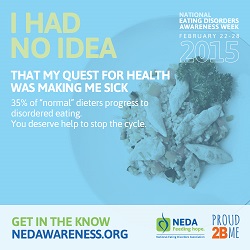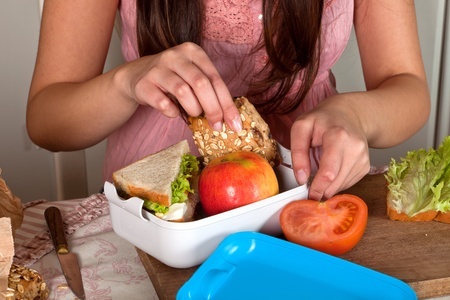 It’s National Eating Disorders Awareness Week, and this year’s theme, “I Had No Idea,” focuses on raising awareness about the possible triggers and warning signs of eating disorders. Being able to recognize these signs, symptoms, and contributing factors makes early intervention possible and can prevent a full-blown eating disorder from developing. Early detection and intervention also increases the chances of full recovery.
It’s National Eating Disorders Awareness Week, and this year’s theme, “I Had No Idea,” focuses on raising awareness about the possible triggers and warning signs of eating disorders. Being able to recognize these signs, symptoms, and contributing factors makes early intervention possible and can prevent a full-blown eating disorder from developing. Early detection and intervention also increases the chances of full recovery.
According to the National Eating Disorders Association (NEDA) website, 20 million women and 10 million men in the United States will suffer from a clinical eating disorder such anorexia nervosa, bulimia nervosa, binge eating disorder, or an eating disorder not otherwise specified (EDNOS) at some point in their life. In addition, there are many who struggle with disordered eating – unhealthy eating behaviors that do not meet the full diagnostic criteria for an eating disorder, but still have detrimental physical and psychological consequences.
Many factors, both genetic and environmental, can contribute to the development of an eating disorder. Although we can’t do much about our genetics, there are risk factors we can control. I’d like to focus on one of the common catalysts for an eating disorder that is completely preventable – dieting.
Most people embark on a diet with good intentions, hoping to feel better in some way. No one goes on a diet thinking, “This diet won’t work,” or “This diet will damage my health.” But diets don’t work. Research shows us that diets rarely result in long-term weight loss and are actually associated with weight gain.
Diets are more than just ineffective – they can be harmful. As the graphic above shows, 35% of “normal dieters” progress to disordered eating, and of those, 20-25% will develop a partial or full-blown eating disorder. Although it is possible to change eating habits in a healthy, sustainable way, too often what starts as a seemingly reasonable diet plan, morphs into an unhealthy obsession. The hyper-focus on weight loss and/or eating perfectly begins to interfere with daily activities and negatively impact health and quality of life.
Here are some warning signs that your diet may have crossed the line from healthy to harmful:
- Avoiding social situations that involve food
- Feeling overwhelmed when unexpected changes occur with your food plan
- Thinking about food all day (especially the foods that you don’t allow yourself to eat)
- Ignoring your body’s signals of hunger
- Feeling constantly deprived and unsatisfied
- Feeling shaky, weak, fatigued, or irritable
- Exercising in a punishing way to burn off what you ate or burn X number of calories
- Frequent worry and anxiety about food
- Feelings of guilt, disgust, or shame about eating
- Hair loss, cold intolerance, irregular or absent menstrual cycles, lightheadedness, fainting, excessive weight loss, or digestive problems
If you are experiencing any of these signs and symptoms or are otherwise concerned about your eating habits or feelings about food, consult with a professional – the sooner the better. There is hope. Eating disorders are preventable and treatable. I have the honor of working with courageous men and women every day as they fight against their eating disorders to reclaim their lives. The process can be challenging at times, but the rewards are infinite.
For more information and resources, visit: nedawareness.org
All statistics quoted in this blog, can be found here.
 Have you ever missed lunch because you didn’t have time to run out and grab a meal? Then you know firsthand that delaying or skipping meals leaves you feeling ravenous. Being overly hungry can decrease focus and productivity and increase irritability and stress. That’s no fun for anyone!
Have you ever missed lunch because you didn’t have time to run out and grab a meal? Then you know firsthand that delaying or skipping meals leaves you feeling ravenous. Being overly hungry can decrease focus and productivity and increase irritability and stress. That’s no fun for anyone!


